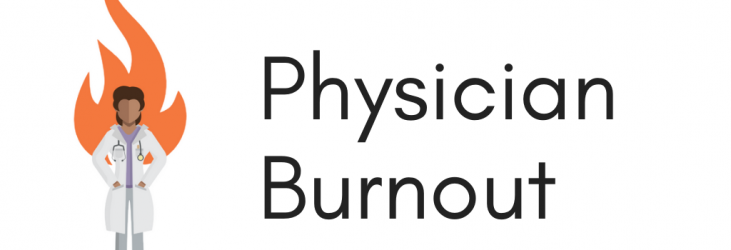
Burnout Epidemic Affects Physicians Nationwide
Cortney Ikpe
If you keep up with news in the world of health care, you may be familiar with the term ‘physician burnout.’ More and more physicians across the nation are reporting having this syndrome, defined by the Agency for Healthcare Research and Quality as a long-term stress reaction marked by emotional exhaustion, depersonalization, and a lack of sense of personal achievement. Let’s look deeper into the cause of this epidemic.
Why are physicians burned out?
In an article posted on our social media, physicians ranked an overload of bureaucratic tasks as the top contributor of burnout. The desired physician-patient relationship has shifted to a monotonous insurer-employer-provider relationship, where the physician is spending increasingly more time with a computer screen and less with patients. This is largely due to the additional requirements of mandated electronic health records (EHRs). Physicians have to spend one to two additional hours of EHR-related tasks for every one hour they spend with a patient. This leads to physicians feeling overworked and less enthusiastic about their daily tasks.
The major factors contributing to physician burnout are as follows:
- Too many bureaucratic tasks: 56%
- Spending too many hours at work: 39%
- Lack of respect from administrators or staff: 26%
- Increasing computerization of practice: 24%
- Insufficient compensation: 24%
- Lack of autonomy: 21%
- Feeling like ‘a cog in the wheel’: 20%
(Source: Medscape National Physician Burnout and Depression Report 2018)
Other sources of burnout reported were a lack of respect from patients, government regulations, decreasing reimbursements, an emphasis on profits over patients, and a maintenance of certification requirements.
What effect does burnout have on physicians and their patients?
First and foremost, burnout has a significant effect on the physician experiencing it. In severe cases, physicians reported being either colloquially (12%) or clinically depressed (3%). Physicians currently have the highest rate of suicide than any other profession in the United States. This alarming statistic is highlighted by changes in the health system over the past decade, which have added to the inherent stress of practicing medicine. According to Medscape, a majority of physicians who committed suicide were untreated or undertreated for their mental illnesses. Many physicians are reluctant to seek help for their burnout or depression because they fear their practicing licenses being revoked, or that their reputations will be damaged because of it.
Patients often experience the collateral damage of physician burnout. A study published by JAMA Internal Medicine found that burnout doubled the chances of physicians being involved in patient safety incidents. Burned-out physicians are more likely to make more errors and provide an overall lower quality of care because of their emotional exhaustion and lack of empathy.
How should physician burnout be addressed?
It has been made clear that physician burnout is a serious issue. Many health professionals are referring to it as a “health care crisis” because of the impact it has on the lives of physicians and patients alike. Giving physicians the autonomy to seek the help they need, without fearing consequences, is a crucial step in addressing this epidemic. Health institutions are already making improvements by implementing personal health programs for physicians. For example, Henry Ford Hospital has organized a new task force and advisory committee specifically for burnout prevention. Stanford came up with a successful “time banking” program where physicians can “bank” time they spend mentoring, serving on committees, or covering their colleagues’ shifts to earn credits to use for work or home-related services. In addition, Johns Hopkins Medical School now requires residents to complete physical and emotional wellness programs for accreditation.
Here at Resolve, we not only want to help physicians find employment, but we want to ensure they get the most out of their future job by fully understanding their goals and needs during the search process. We work for the physician, not the employer. To get started, or to learn more about Resolve, contact one of our agents today at 1-877-758-3318.